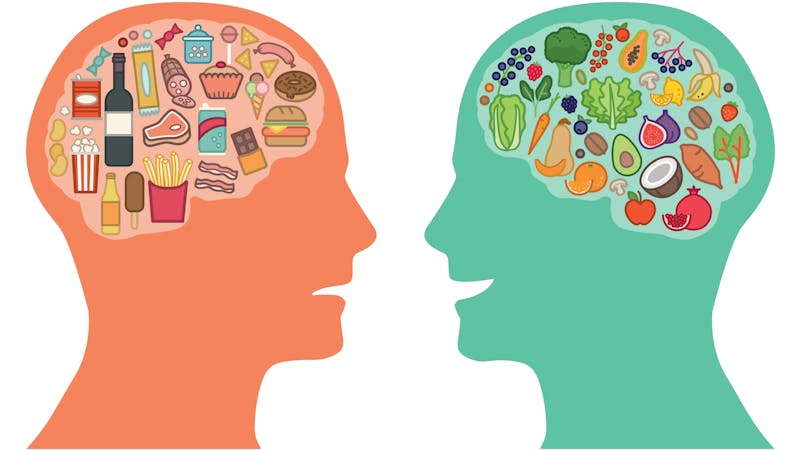Low carb and mental health:
The food-mood connection
Could this same nutritional strategy benefit the brain as well? Emerging science and clinical experience suggest that the answer could be yes.2
This logical idea has given birth to the new field of nutritional psychiatry, dedicated to understanding how dietary choices affect our mood, thinking, and behavior. Emerging science and real-world experiences are revealing this empowering and hopeful new message: feeding your brain properly has the potential to prevent or help treat mental health disorders, and in some cases help people reduce or even eliminate the need for psychiatric medications.
The steep rise in mental health problems around the world in recent decades closely parallels the pattern of many other so-called “diseases of civilization” associated with the industrialization of the human diet.4
What best distinguishes today’s so-called “Western” diet from every dietary pattern that has ever come before it is not the presence of natural foods like meat and vegetables, but the abundance of refined carbohydrates like sugar and flour, along with refined seed oils (aka “vegetable oils”) like soybean and sunflower oil. Refined carbs and seed oils, which are found in most of the processed and prepared food on the market, are the signature ingredients of modern diets.
Could excessive refined carbohydrates and seed oils contribute to caloric overconsumption, metabolic disease, and mental health problems? The research is emerging but so far it is suggestive.5
To be clear, these are not the only forces at play, and poor dietary quality is not the only factor influencing our risk for psychiatric disorders. However, since there is evidence connecting food choices with disease-producing processes, improving dietary quality by emphasizing whole foods and avoiding refined carbohydrates and modern highly-processed ingredients, makes good sense.
Academic interest in ketogenic diets for the management of psychiatric conditions has grown substantially in the past several years. This is because decades of scientific research have established that ketogenic diets can address many of the imbalances in brain biochemistry that are seen in neuropsychiatric conditions, including neuroinflammation, excessive oxidative stress, neurotransmitter imbalances, and altered metabolism.6
While the scientific study of ketogenic diets for the management of specific psychiatric disorders is in its infancy, emerging clinical and research experiences support the idea that ketogenic diets could represent uniquely therapeutic treatment options for a wide variety of mental health concerns.
Low carbohydrate diets and psychiatric disorders
Anxiety disorders
Anxiety disorders include generalized anxiety disorder (excessive worry), panic disorder, post-traumatic stress disorder, obsessive-compulsive disorder, and social phobia. While clinical studies of ketogenic diets in the treatment of anxiety disorders have yet to be conducted, recently published reviews have explored the potential for ketogenic diets to address some of the biochemical mechanisms underlying anxiety.7
In my clinical experience, anxiety reduction is one of the most common benefits of LCHF diets.
A 31-year-old Mexican-American Harvard post-doctoral student came to me requesting help with frequent panic attacks, irritability, constant food cravings, “emotional eating,” and sleepiness occurring two hours after meals. She was very health-conscious and hoped to avoid medication. I told her that her symptoms were probably related to carbohydrate sensitivity and recommended a whole foods LCHF diet. She changed her diet from this:
- Breakfast: Toast with peanut butter or Nutella, coffee with skim milk
- Lunch: Salad with tuna or cheese and a piece of bread
- Dinner: Pasta with cheese
- Snacks: Bananas and yogurt
to this:
- Breakfast: Two eggs with butter and guacamole
- Lunch: Meat and non-starchy vegetable
- Dinner: Meat and non-starchy vegetable
- Snacks: Nuts and cheese
When asked how the new diet had affected her symptoms, she told me: “I don’t know how I dealt with it because they all used to bother me A LOT, but I would say that the symptoms are 90% gone.”8
Depression
Although we lack direct causative evidence showing that inflammation and insulin resistance play an important role in the development or severity of depressive disorders, we do have indirect evidence. Medicines which reduce inflammation and improve insulin resistance can effectively treat depression symptoms.9 Could better nutrition help reduce inflammation and insulin resistance and thereby improve mental health?
In 2017, a small controlled clinical trial found that people diagnosed with Major Depressive Disorder who switched from a very poor quality modern diet to a Mediterranean-style diet experienced, on average, more relief from depression symptoms than those who made no dietary changes. A second study of a similar diet supplemented with fish oil noted benefits as well.10
These studies demonstrate that dietary quality matters to mental health. But they can’t tell us whether a Mediterranean diet is the best diet for the brain, only that it’s better than the standard modern diet. While it is tempting to believe that these diets reduced depression symptoms because they are higher in foods like olive oil and nuts, they were also designed to be very low in refined carbohydrates, sugars, and seed oils. Researchers are now beginning to consider how sugar consumption can contribute to the risk of depression including inflammation, oxidative stress, insulin resistance, imbalances in gut bacterial populations, and disruption of dopamine signaling in brain reward pathways.11 More studies are needed to explore how and why different diets may affect depression symptoms.
There are no published human trials yet on low carbohydrate diets and depression, but there are numerous instances within my own practice of ketosis relieving significant chronic depression symptoms, including this one:12
A 46-year-old musician and entrepreneur with severe depression since age 11 whose symptoms included fatigue, brain fog, anxiety, and frequent suicidal thoughts, consulted with me because he continued to suffer from all of these symptoms and was unable to work despite taking lamotrigine for depression and trazodone for sleep. At the time of his first appointment, he was eating a standard modern diet high in sugar and processed foods. After transitioning to a ketogenic diet, he felt more confident, hopeful, energetic, creative, and productive. When in ketosis, he “flourishes”; his suicidal thoughts subside and he feels as though life is worth living. He is now working full-time and has begun gradually reducing the dosages of his medications. He describes ketosis as “a miraculous medication.”
Bipolar disorders
Bipolar disorders used to be called “manic-depression.” They come in many forms, including bipolar type 1, bipolar type 2, and some common milder forms that don’t fit neatly into either category. All of these disorders are characterized by unstable mood patterns that include periods of increased intensity (“highs”) such as mania, irritability, or severe anxiety, usually alternating with periods of depression. Interestingly, bipolar disorders and epilepsy have a lot in common, including similar neurotransmitter imbalances and electrolyte disturbances.13
Since some of the same medications are used to treat both disorders, it’s logical to wonder whether ketogenic diets, which have been used to treat epilepsy for nearly a century, could be helpful in managing bipolar disorder as well.
- A study of 121 people with bipolar mood disorders found that those who also have insulin resistance or type 2 diabetes face a harder road than those who don’t. 14 Those with insulin resistance or type 2 diabetes were more likely to have chronic and rapidly-cycling mood symptoms and were less likely to respond to the mood-stabilizing medication lithium.
- In a published case study, two women with bipolar 2 disorder reported that a ketogenic diet was superior to the anticonvulsant/mood stabilizer lamotrigine (Lamictal) for managing their mood symptoms and that they were able to stop taking medication.15
- In an example from my own practice, a 26-year-old woman with bipolar 2 disorder who had struggled with bulimia and frequent migraines for many years adopted an LCHF diet and experienced complete resolution of binge-purge behaviors, migraines, and premenstrual distress.16 In addition, her “highs” shifted from angry to happy and her “lows” became less intense. We managed the leftover depression symptoms with a low dose of lamotrigine (a mood-stabilizing antidepressant medication) and psychotherapy.
Psychosis
Psychotic symptoms don’t just occur in people with schizophrenia. They can also occur in many other psychiatric conditions, including depression, bipolar disorder, substance use disorders, and dementia.
Signs of psychosis include paranoia, auditory hallucinations (hearing voices), visual hallucinations (seeing things that aren’t there), intrusive thoughts/images, and/or disorganized thinking. People diagnosed with schizophrenia are more likely to have glucose regulation problems and insulin resistance, even if they’ve never taken antipsychotic medications known to increase risk for these metabolic problems.17
We don’t have enough information yet to know whether insulin resistance may play a causal role in schizophrenia, only that the two conditions often go hand in hand.
In animal studies, ketogenic diets have been shown to reverse some of the brain signaling abnormalities responsible for the development of certain psychotic symptoms such as hallucinations.18
A small but growing number of published case reports have documented that low carbohydrate diets appear to dramatically improve symptoms of psychosis in some individuals, in two instances allowing for the complete discontinuation of antipsychotic medication and significant improvement in function.19
One of the most remarkable examples, first published by Dr. Eric Westman and Dr. Bryan Kraft in 2009, tells the story of a 70-year old woman who had suffered from auditory and visual hallucinations since age seven. Within only eight days of switching to a low carbohydrate diet, her symptoms noticeably improved, and she eventually discontinued antipsychotic medication. Twelve years later, at age 83, she was still following a low carbohydrate diet, had lost 150 pounds, and remained off of antipsychotic medication.
20
You can read more details about some of these cases in this article: “Ketogenic diets for psychiatric disorders: a new 2017 review.”
Note that it’s not possible to know how common these experiences of improvement are, or what exactly they are caused by.
Autistic spectrum disorder (ASD)
Three small clinical studies and two case reports have demonstrated that a ketogenic diet may be helpful for symptoms of autism spectrum conditions in some children.21
In a 6-month pilot study, 18/30 children (60%) with autistic behaviors were able to adhere to a ketogenic diet supplemented with MCT oil. All 18 of these children experienced some degree of benefit, with two children improving enough to advance to mainstream schools22
And in a 6-month randomized controlled trial of 45 children diagnosed with autism spectrum disorder, a modified Atkins diet outperformed a gluten-free/casein-free diet for the management of autistic symptoms.23
Attention deficit/hyperactivity disorder (ADHD)
While there are studies suggesting that simplified low-allergen diets consisting primarily of whole foods can be very helpful in children with ADHD, there are no studies yet that explore the relationship between refined carbohydrates and ADHD. Nor are there any that test low carbohydrate diets on children or adults with ADHD.24
However, in my clinical experience, improved mental clarity is one of the most commonly reported benefits of low carbohydrate diets, and I have seen cases of even severe ADHD that have responded to dietary intervention, such as this one:
Several years ago, I met with a 40-year-old woman who’d had lifelong symptoms of procrastination, lateness, poor motivation, low energy, distractibility, and disorganization that interfered significantly with her effectiveness at work and at home. I diagnosed her with ADHD, inattentive type, and she was started on Adderall (mixed amphetamine salts). Adderall greatly improved her symptoms but brought uneven benefits throughout the day and some annoying side effects. Over the past couple of years, she gradually improved the quality of her diet by removing grains, legumes, dairy, and most processed foods, which helped her mood and improved her physical health tremendously, but did nothing for the ADHD symptoms.
When she decided to shift to a ketogenic diet several months ago, her symptoms began improving within just a few days. She has since stopped Adderall entirely and reports that she functions even better when in ketosis than on Adderall, without any side effects.25
Alzheimer’s disease
Research exploring the connection between metabolism and most psychiatric disorders is in its infancy, but when it comes to Alzheimer’s disease, we have multiple lines of evidence demonstrating that insulin resistance of the brain is not only a core feature of Alzheimer’s disease but is likely to be a primary driving force in the development of this devastating illness. The relationship between insulin resistance and Alzheimer’s is so strong that many scientists now refer to Alzheimer’s as “type 3 diabetes.”26
One of the ways insulin resistance contributes to poor brain function in Alzheimer’s disease is by restricting insulin’s entry into the brain.27
Since insulin is required for brain cells to use glucose effectively, low brain insulin may cause sluggish brain glucose processing and slowing of brain cell activity. This drop in brain power can begin decades before any cognitive symptoms become obvious and has been detected in women as young as 24 years old.28 So it’s never too early to begin reducing your risk.
It’s also almost never too late. A growing number of studies demonstrate that ketogenic diets and/or ketone supplements modestly improve thinking and memory in some people with “mild cognitive impairment” (pre-Alzheimer’s) and early Alzheimer’s disease.29 In the 2018 study described here, the LCHF diet plus MCT oil supplements (which raise blood ketone levels) improved cognitive test scores in people with mild Alzheimer’s disease a little better than any existing Alzheimer’s medication.30 This dietary strategy was safe, well-tolerated and manageable with the help of a caregiver.
Preliminary results from an ongoing Johns Hopkins University randomized controlled trial of a modified Atkins diet found that
those able to adhere to the diet scored significantly higher on memory testing after only six weeks compared to those assigned
to consume the diet recommended by the National Institute on Aging, which is essentially a low fat Mediterranean-style diet. 31
And a 2020 systematic review of randomized controlled trials concluded that being in ketosis, either through a kethogenic diet, ketone supplements, or MCT supplements, “appears promising in improving both acute and long-term cognition among patients with AD/MCI (Alzheimer’s Disease or mild cognitive impairment).” They also noted a greater beneficial effect in those without an ApoE4 gene.32
The most rigorous trial of ketogenic diets in Alzheimer’s disease to date was published in February 2021 by researchers in New Zealand. 21 of 26 subjects diagnosed with mild Alzheimer’s disease completed a 12-week randomized crossover trial of a modified ketogenic diet vs. a low fat diet. Beta-hydroxybutyrate (blood ketone) levels averaged approximately 0.95 mM, which is much higher than previous studies have reported. While no significant improvement in cognitive testing was seen, a significant improvement on tests of daily function and quality of life was reported.33
These studies provide hope for people with memory issues related to Alzheimer’s disease, but their findings tend to be quite modest, and most researchers note that adhering to a new way of eating can be particularly challenging for people with cognitive challenges.
In my clinical practice, I have found that, in addition to the full support and cooperation of household members and caregivers, frequent clinical contact to provide ongoing education, close monitoring of clinical progress, and guidance around dietary adjustments is key to helping people achieve and maintain the degree of nutritional ketosis necessary for noticeable benefits in mental clarity.

A ketogenic diet and Alzheimer's
GuideAlzheimer’s disease and other related neurodegenerative conditions, which impact memory, behavior and decision-making, are now an epidemic hitting all Western societies. Can the ketogenic diet help with Alzheimer’s prevention and treatment?
To learn more about how Alzheimer’s develops and what you can do about it, watch this video:
Eating disorders
In my clinical practice, people with binge eating and bulimia who try a low carbohydrate diet often experience relief from binge behaviors, because their cravings usually diminish significantly.34
Since binge eating triggers the impulse to purge, carbohydrate restriction can be a very helpful strategy for people with bulimia who are willing to change their diet. However, for some people, carbohydrate restriction is not sufficient to control cravings, as other foods can also trigger overeating in some individuals, with dairy, nuts, and sweeteners being the most common culprits.35 Identifying and eliminating trigger foods may be helpful in some cases.
Although no randomized clinical trials exist, a published case report of three adults with binge eating disorder and food addiction documents remarkable improvement in symptoms when carbohydrate intake was restricted to a maximum of 30 grams per day. This simple intervention brought binge episodes down from once or twice per day to essentially zero episodes per week, and these improvements were maintained even six months later. These outcomes mirror the clinical experience of many and are encouraging for future research efforts.36
However, if you have a history of undereating or have ever had anorexia, anorexic thought patterns, or are uncomfortable with eating fat, a low carbohydrate diet may not be right for you. When you dramatically reduce carbohydrate, you must replace those calories with calories from healthy fats. If you can’t increase your fat consumption substantially, a low carbohydrate diet could be deadly, especially if you are already underweight or malnourished. If you are considering a low carbohydrate diet, please seek medical and psychiatric consultation to discuss the risks and benefits as they pertain to your personal history and goals.
Summary
Although the food-mood link is still an emerging field of study, there is great potential for many to unlock better mental health by modifying our modern diets and giving up processed food.
But how do you begin a low carb diet? And how might psychiatric medications be affected? Please see our guide about easing into a low carb diet if you are taking medication for mental health issues.
And don’t miss our FAQ: Answers to common questions about low carbohydrate diets for mental health!
More
Ketogenic diet for mental health: Come for the weight loss, stay for the mental health benefits?
Low carb and mental health: The food-mood connection - the evidence
This guide is written by Dr. Georgia Ede, MD and was last updated on June 19, 2025. It was medically reviewed by Dr. Bret Scher, MD on February 8, 2022.
The guide contains scientific references. You can find these in the notes throughout the text, and click the links to read the peer-reviewed scientific papers. When appropriate we include a grading of the strength of the evidence, with a link to our policy on this. Our evidence-based guides are updated at least once per year to reflect and reference the latest science on the topic.
All our evidence-based health guides are written or reviewed by medical doctors who are experts on the topic. To stay unbiased we show no ads, sell no physical products, and take no money from the industry. We're fully funded by the people, via an optional membership. Most information at Diet Doctor is free forever.
Read more about our policies and work with evidence-based guides, nutritional controversies, our editorial team, and our medical review board.
Should you find any inaccuracy in this guide, please email andreas@dietdoctor.com.
Psychosomatic Medicine 2019: The effects of dietary improvement on symptoms of depression and anxiety: a meta-analysis of randomized controlled trials [systematic review of randomized trials; strong evidence]
Journal of Alzheimer’s Disease 2019: Preliminary report on the feasibility and efficacy of the modified Atkins diet for treatment of mild cognitive impairment and early Alzheimer’s disease [very small randomized trial; weak evidence]
Frontiers in Psychiatry 2017: The current status of the ketogenic diet in psychiatry [narrative review of mechanisms, case studies, and animal reports; very weak evidence]
Neuroscience and Biobehavioral Reviews 2018: Ketogenic diet as a metabolic therapy for mood disorders: evidence and developments [overview article; ungraded]
↩Indian Journal of Psychiatry 2008: Understanding nutrition, depression and mental illnesses [overview article; ungraded] ↩
This is a review of observational studies exploring a possible connection between modernization and increased rates of mental illness. The strength of association reported in the individual studies cited within the review ranges from inconclusive to very weak:
Journal of Affective Disorders 2013: Depression as a disease of modernity: explanations for increasing prevalence [very weak evidence] ↩
The Proceedings of the Nutrition Society 2017: Nutritional psychiatry: the present state of the evidence [overview article; ungraded] ↩
Current Opinions in Endocrinology, Diwbetes, and Obesity 2020: Ketogenic diet as a metabolic treatment for mental illness[overview article; ungraded] ↩
Frontiers in Psychiatry 2021: Nutrition as Metabolic Treatment for Anxiety[overview article; ungraded]
Nutrients 2020: Ketogenic Diet: A Dietary Modification as an Anxiolytic Approach?[overview article; ungraded]
↩Pharmacopsychiatry 2017: PPAR-γ agonists for the treatment of major depression: a review [randomized controlled trials; moderate evidence] ↩
Both studies were RCTs that added Mediterranean-style diets to existing conventional treatments (medications and/or therapy).
BMC Medicine 2017: A randomised controlled trial of dietary improvement for adults with major depression (the ‘SMILES’ trial) [moderate evidence]
Nutrition Neuroscience 2017: A Mediterranean-style dietary intervention supplemented with fish oil improves diet quality and mental health in people with depression: a randomized controlled trial (HELFIMED) [moderate evidence] ↩
Medical Hypotheses 2019: The depressogenic potential of added dietary sugars [overview; ungraded] ↩
Shared with permission. [anecdotal reports; very weak evidence] ↩
Expert Review of Neurotherapeutics 2010: Epilepsy and bipolar disorders [reviews multiple lines of evidence; ungraded] ↩
Although this study finds strong odds ratios well exceeding 2.0, this is a single observational, cross-sectional study. Therefore, the strength of evidence is very weak:
Bipolar Disorders 2015: Insulin resistance in bipolar disorder: relevance to routine clinical care [very weak evidence] ↩
Neurocase 2013: The ketogenic diet for type II bipolar disorder [very weak evidence] ↩
JAMA Psychiatry 2017: Glucose homeostasis in first-episode schizophrenia: a systematic review and meta-analysis [systematic review of case-control studies; weak evidence] ↩
Neuropsychopharmachology 2020: Ketogenic Therapy in Serious Mental Illness: Emerging Evidence[overview article; ungraded] ↩
Current Opinions in Psychiatry 2019:
Ketogenic diet for schizophrenia: clinical implication[overview article; ungraded]American Journal of Psychiatry 1965: A pilot study of the ketogenic diet in schizophrenia [very weak evidence]
Schizophrenia Research 2017: Ketogenic diet in the treatment of schizoaffective disorder: two case studies [very weak evidence] ↩
Note that it’s not possible to know how common these experiences of improvement may be, and that we can’t be sure improvement was due to carbohydrate restriction.
Nutrition & Metabolism 2009: Schizophrenia, gluten, and low-carbohydrate, ketogenic diets: a case report and review of the literature [very weak evidence] ↩
Journal of Child Neurology 2003: Application of a ketogenic diet in children with autistic behavior: pilot study [non-controlled study; weak evidence]
In a 6-month randomized controlled trial of 45 children diagnosed with autism spectrum disorder, a modified Atkins diet outperformed a gluten-free/casein-free diet for the management of autistic symptoms.
Metabolic Brain Disorders 2017: Ketogenic diet versus gluten free casein free diet in autistic children: a case-control study [randomized trial; moderate evidence]
In a 3-month study, 8/15 children placed on a gluten-free modified ketogenic diet supplemented with MCT oil experienced substantial improvement in symptoms
Physiology and Behavior 2018: A modified ketogenic gluten-free diet with MCT improves behavior in children with autism spectrum disorder [nonrandomized study, weak evidence]
Case reports:
Metabolic Brain Disorders 2018: Therapeutic use of carbohydrate-restricted diets in an autistic child; a case report of clinical and 18FDG PET findings [case report; very weak evidence]
Journal of Child Neurology 2013: Autism and dietary therapy: case report and review of the literature [very weak evidence] ↩
Journal of Child Neurology 2003: Application of a ketogenic diet in children with autistic behavior: pilot study [non-controlled study; weak evidence] ↩
Metabolic Brain Disorders 2017: Ketogenic diet versus gluten free casein free diet in autistic children: a case-control study [randomized trial; moderate evidence] ↩
This article includes a meta-analysis of seven small randomized controlled trials of elimination and low-allergen diets; while outcomes are solid, consistent, and positive, there are methodological weaknesses. Therefore, the strength of the evidence is moderate:
American Journal of Psychiatry 2013: Nonpharmacological interventions for ADHD: systematic review and meta-analyses of randomized controlled trials of dietary and psychological treatments [moderate evidence] ↩
Journal of Diabetes Science and Technology 2008: Alzheimer’s disease is type 3 diabetes: evidence reviewed [overview article; ungraded] ↩
Journal of Neuroscience Research 2017: Cerebral hypoperfusion and glucose hypometabolism: key pathophysiological modulators promote neurodegeneration, cognitive impairment, and Alzheimer’s disease [overview article; ungraded] ↩
Nutrition 2011: Brain fuel metabolism, aging and Alzheimer’s disease [overview article; ungraded]
PloS One 2015: Regional brain glucose hypometabolism in young women with polycystic ovary syndrome: possible link to mild insulin resistance [case-control study; weak evidence] ↩
Neurobiology of Aging 2012: Dietary ketosis enhances memory in mild cognitive impairment [moderate evidence]
Nutrition & Metabolism 2012: Study of the ketogenic agent AC-1202 in mild to moderate Alzheimer’s disease: a randomized, double-blind, placebo-controlled, multicenter trial [moderate evidence]
Alzheimers & Dementia 2018: Feasibility and efficacy data from a ketogenic diet intervention in Alzheimer’s disease [non-controlled trial; weak evidence]
Journal of Alzheimer’s Disease 2019: Preliminary report on the feasibility and efficacy of the modified Atkins diet for treatment of mild cognitive impairment and early Alzheimer’s disease [very small randomized trial; weak evidence]
Alzheimers & Dementia 2015: A new way to produce hyperketonemia: use of ketone ester in a case of Alzheimer’s disease [very weak evidence] ↩
Alzheimers & Dementia 2018: Feasibility and efficacy data from a ketogenic diet intervention in Alzheimer’s disease [non-controlled trial; weak evidence] ↩
Journal of Alzheimer’s Disease 2019: Preliminary Report on the Feasibility and Efficacy of the Modified Atkins Diet for Treatment of Mild Cognitive Impairment and Early Alzheimer’s Disease[randomized trial; moderate evidence] ↩
Advances in Nutrition 2020:
To Keto or Not to Keto? A Systematic Review of Randomized Controlled Trials Assessing the Effects of Ketogenic Therapy on Alzheimer Disease [systematic review of randomized trials; strong evidence] ↩Alzheimer’s research and Therapt 2021: Randomized crossover trial of a modified ketogenic diet in Alzheimer’s disease[randomized trial; moderate evidence] ↩
Journal of Eating Disorders 2020: Treating binge eating and food addiction symptoms with low carbohydrate Ketogenic diets: a case series [case series, weak evidence] ↩



